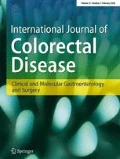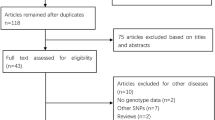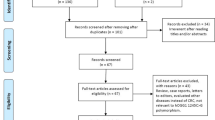Abstract
Introduction
Since Kurzawski et al. described an association between the 3020insC NOD2 single nucleotide polymorphism and the risk of colorectal cancer(CRC) in 2004, reports published in the past several years have controversial results regarding the relationship between the development of CRC and NOD2 gene polymorphisms. To clarify the potential role of NOD2 P286S, R702W, G908R, and 3020insC polymorphisms in CRC patients, we have undertaken a systematic review and meta-analysis of published articles.
Materials and methods
Studies reporting on NOD2 polymorphisms and CRC were searched in the PubMed, EMBASE, and the Science Citation Index from the inception of each database to May, 2009. The search strategy included the keywords “CRC”, “colon cancer”, “rectal cancer”, “polymorphism”, and “NOD2/CARD15”.
Result
Eight eligible case-control studies about Caucasians from four countries contributed data on 5,888 subjects (cases: 3,524; controls: 2,364). Compared to the wild genotype, the R702W, G908R, and 3020insC polymorphisms were associated with an increased risk of CRC (odds ratio (OR): 1.59, 1.98, 1.44; 95% confidence interval (CI): 1.09–2.32, 1.14–3.44, 1.13–1.84; P = 0.02, 0.01, 0.003). However, P268S polymorphism did not influence CRC risk (OR: 1.27; CI: 0.32–5.00; P = 0.73).
Conclusions
These findings indicate that NOD2 R702W, G908R, and 3020insC polymorphisms contribute to CRC susceptibility in Caucasians. Meta-analysis of these polymorphisms in NOD2 gene will help determine their role in CRC carcinogenesis.






Similar content being viewed by others
References
Capurso G, Marignani M, Delle Fave G (2006) Probiotics and the incidence of colorectal cancer: when evidence is not evident. Dig Liver Dis 38(Suppl 2):S277–S282
Kim HJ, Yu MH, Kim H, Byun J, Lee C (2008) Noninvasive molecular biomarkers for the detection of colorectal cancer. BMB Rep 41:685–692
Loffler I, Grun M, Bohmer FD, Rubio I (2008) Role of cAMP in the promotion of colorectal cancer cell growth by prostaglandin E2. BMC Cancer 8:380
Takahashi H, Inamori M (2009) Lifestyle-related disease and colorectal cancer. Intern Med 48:121
Kasztelan-Szczerbinska B, Cichoz-Lach H, Slomka M (2008) Colorectal cancer as a health care problem: evaluation of the current diagnostic options. Pol Arch Med Wewn 118:224–227
Velculescu VE (2008) Defining the blueprint of the cancer genome. Carcinogenesis 29:1087–1091
Hisamuddin IM, Yang VW (2004) Genetics of colorectal cancer. MedGenMed 6:13
Cheah PY (2009) Recent advances in colorectal cancer genetics and diagnostics. Crit Rev Oncol Hematol 69:45–55
Chu E (2009) Clinical colorectal cancer: "2008—the year in review". Clin Colorectal Cancer 8:9–10
Hampe J, Cuthbert A, Croucher PJ, Mirza MM, Mascheretti S, Fisher S et al (2001) Association between insertion mutation in NOD2 gene and Crohn's disease in German and British populations. Lancet 357:1925–1928
Hugot JP, Chamaillard M, Zouali H, Lesage S, Cezard JP, Belaiche J et al (2001) Association of NOD2 leucine-rich repeat variants with susceptibility to Crohn's disease. Nature 411:599–603
Ogura Y, Bonen DK, Inohara N, Nicolae DL, Chen FF, Ramos R et al (2001) A frameshift mutation in NOD2 associated with susceptibility to Crohn’s disease. Nature 411:603–606
Inohara C, McDonald C, Nunez G (2005) NOD-LRR proteins: role in host-microbial interactions and inflammatory disease. Annu Rev Biochem 74:355–383
Girardin SE, Boneca IG, Viala J, Chamaillard M, Labigne A, Thomas G et al (2003) Nod2 is a general sensor of peptidoglycan through muramyl dipeptide (MDP) detection. J Biol Chem 278:8869–8872
Inohara N, Nunez G (2001) The NOD: a signaling module that regulates apoptosis and host defense against pathogens. Oncogene 20:6473–6481
Inohara N, Ogura Y, Fontalba A, Gutierrez O, Pons F, Crespo J et al (2003) Host recognition of bacterial muramyl dipeptide mediated through NOD2. Implications for Crohn's disease. J Biol Chem 278:5509–5512
Girardin SE, Tournebize R, Mavris M, Page AL, Li X, Stark GR et al (2001) CARD4/Nod1 mediates NF-kappaB and JNK activation by invasive Shigella flexneri. EMBO Rep 2:736–742
Angeletti S, Galluzzo S, Santini D, Ruzzo A, Vincenzi B, Ferraro E et al (2009) NOD2/CARD15 polymorphisms impair innate immunity and increase susceptibility to gastric cancer in an Italian population. Hum Immunol 70(9):729–732
Jackson JR, Seed MP, Kircher CH, Willoughby DA, Winkler JD (1997) The codependence of angiogenesis and chronic inflammation. FASEB J 11:457–465
Jaiswal M, LaRusso NF, Burgart LJ, Gores GJ (2000) Inflammatory cytokines induce DNA damage and inhibit DNA repair in cholangiocarcinoma cells by a nitric oxide-dependent mechanism. Cancer Res 60:184–190
Nakajima N, Kuwayama H, Ito Y, Iwasaki A, Arakawa Y (1997) Helicobacter pylori, neutrophils, interleukins, and gastric epithelial proliferation. J Clin Gastroenterol 25(Suppl 1):S198–S202
Bernstein CN, Blanchard JF, Kliewer E, Wajda A (2001) Cancer risk in patients with inflammatory bowel disease: a population-based study. Cancer 91:854–862
Jess T, Gamborg M, Matzen P, Munkholm P, Sorensen TI (2005) Increased risk of intestinal cancer in Crohn's disease: a meta-analysis of population-based cohort studies. Am J Gastroenterol 100:2724–2729
Leshinsky-Silver E, Karban A, Buzhakor E, Fridlander M, Yakir B, Eliakim R et al (2005) Is age of onset of Crohn's disease governed by mutations in NOD2/caspase recruitment domains 15 and Toll-like receptor 4? Evaluation of a pediatric cohort. Pediatr Res 58:499–504
Alhopuro P, Ahvenainen T, Mecklin JP, Juhola M, Jarvinen HJ, Karhu A et al (2004) NOD2 3020insC alone is not sufficient for colorectal cancer predisposition. Cancer Res 64:7245–7247
Kurzawski G, Suchy J, Kladny J, Grabowska E, Mierzejewski M, Jakubowska A et al (2004) The NOD2 3020insC mutation and the risk of colorectal cancer. Cancer Res 64:1604–1606
Lakatos PL, Hitre E, Szalay F, Zinober K, Fuszek P, Lakatos L et al (2007) Common NOD2/CARD15 variants are not associated with susceptibility or the clinicopathologic characteristics of sporadic colorectal cancer in Hungarian patients. BMC Cancer 7:54
Papaconstantinou I, Theodoropoulos G, Gazouli M, Panoussopoulos D, Mantzaris GJ, Felekouras E et al (2005) Association between mutations in the CARD15/NOD2 gene and colorectal cancer in a Greek population. Int J Cancer 114:433–435
Roberts RL, Gearry RB, Allington MD, Morrin HR, Robinson BA, Frizelle FA (2006) Caspase recruitment domain-containing protein 15 mutations in patients with colorectal cancer. Cancer Res 66:2532–2535
Suchy J, Klujszo-Grabowska E, Kladny J, Cybulski C, Wokolorczyk D, Szymanska-Pasternak J et al (2008) Inflammatory response gene polymorphisms and their relationship with colorectal cancer risk. BMC Cancer 8:112
Szeliga J, Sondka Z, Jackowski M, Jarkiewicz-Tretyn J, Tretyn A, Malenczyk M (2008) NOD2/CARD15 polymorphism in patients with rectal cancer. Med Sci Monit 14:CR480–CR484
Tuupanen S, Alhopuro P, Mecklin JP, Jarvinen H, Aaltonen LA (2007) No evidence for association of NOD2 R702W and G908R with colorectal cancer. Int J Cancer 121:76–79
Moher D, Cook DJ, Eastwood S, Olkin I, Rennie D, Stroup DF (1999) Improving the quality of reports of meta-analyses of randomised controlled trials: the QUOROM statement. Quality of Reporting of Meta-analyses. Lancet 354:1896–1900
Hampe J, Grebe J, Nikolaus S, Solberg C, Croucher PJ, Mascheretti S et al (2002) Association of NOD2 (CARD 15) genotype with clinical course of Crohn's disease: a cohort study. Lancet 359:1661–1665
Inohara N, Ogura Y, Chen FF, Muto A, Nunez G (2001) Human Nod1 confers responsiveness to bacterial lipopolysaccharides. J Biol Chem 276:2551–2554
Ogura Y, Inohara N, Benito A, Chen FF, Yamaoka S, Nunez G (2001) Nod2, a Nod1/Apaf-1 family member that is restricted to monocytes and activates NF-kappaB. J Biol Chem 276:4812–4818
Chen F, Castranova V, Shi X (2001) New insights into the role of nuclear factor-kappaB in cell growth regulation. Am J Pathol 159:387–397
Dejardin E, Deregowski V, Chapelier M, Jacobs N, Gielen J, Merville MP et al (1999) Regulation of NF-kappaB activity by I kappaB-related proteins in adenocarcinoma cells. Oncogene 18:2567–2577
Gilmore TD, Koedood M, Piffat KA, White DW (1996) Rel/NF-kappaB/IkappaB proteins and cancer. Oncogene 13:1367–1378
Mukhopadhyay T, Roth JA, Maxwell SA (1995) Altered expression of the p50 subunit of the NF-kappa B transcription factor complex in non-small cell lung carcinoma. Oncogene 11:999–1003
Sovak MA, Bellas RE, Kim DW, Zanieski GJ, Rogers AE, Traish AM et al (1997) Aberrant nuclear factor-kappaB/Rel expression and the pathogenesis of breast cancer. J Clin Invest 100:2952–2960
Huzarski T, Lener M, Domagala W, Gronwald J, Byrski T, Kurzawski G et al (2005) The 3020insC allele of NOD2 predisposes to early onset breast cancer. Breast Cancer Res Treat 89:91–93
Rothman N, Skibola CF, Wang SS, Morgan G, Lan Q, Smith MT et al (2006) Genetic variation in TNF and IL10 and risk of non-Hodgkin lymphoma: a report from the InterLymph Consortium. Lancet Oncol 7:27–38
Yang SK, Loftus EV Jr, Sandborn WJ (2001) Epidemiology of inflammatory bowel disease in Asia. Inflamm Bowel Dis 7:260–270
Inoue N, Tamura K, Kinouchi Y, Fukuda Y, Takahashi S, Ogura Y et al (2002) Lack of common NOD2 variants in Japanese patients with Crohn’s disease. Gastroenterology 123:86–91
Cavanaugh JA, Adams KE, Quak EJ, Bryce ME, O'Callaghan NJ, Rodgers HJ et al (2003) CARD15/NOD2 risk alleles in the development of Crohn's disease in the Australian population. Ann Hum Genet 67:35–41
Andersen V, Agerstjerne L, Jensen D, Ostergaard M, Saebo M, Hamfjord J et al (2009) The multidrug resistance 1 (MDR1) gene polymorphism G-rs3789243-A is not associated with disease susceptibility in Norwegian patients with colorectal adenoma and colorectal cancer; a case control study. BMC Med Genet 10:18
Giovannucci E, Rimm EB, Stampfer MJ, Colditz GA, Ascherio A, Kearney J et al (1994) A prospective study of cigarette smoking and risk of colorectal adenoma and colorectal cancer in U.S. men. J Natl Cancer Inst 86:183–191
Ernst A, Jacobsen B, Ostergaard M, Okkels H, Andersen V, Dagiliene E et al (2007) Mutations in CARD15 and smoking confer susceptibility to Crohn's disease in the Danish population. Scand J Gastroenterol 42:1445–1451
Hansen RD, Sorensen M, Tjonneland A, Overvad K, Wallin H, Raaschou-Nielsen O et al (2008) A haplotype of polymorphisms in ASE-1, RAI and ERCC1 and the effects of tobacco smoking and alcohol consumption on risk of colorectal cancer: a Danish prospective case-cohort study. BMC Cancer 8:54
Anderson JC, Attam R, Alpern Z, Messina CR, Hubbard P, Grimson R et al (2003) Prevalence of colorectal neoplasia in smokers. Am J Gastroenterol 98:2777–2783
Liang PS, Chen TY, Giovannucci E (2009) Cigarette smoking and colorectal cancer incidence and mortality: systematic review and meta-analysis. Int J Cancer 124:2406–2415
Lichtenstein P, Holm NV, Verkasalo PK, Iliadou A, Kaprio J, Koskenvuo M et al (2000) Environmental and heritable factors in the causation of cancer—analyses of cohorts of twins from Sweden, Denmark, and Finland. N Engl J Med 343:78–85
Aaltonen L, Johns L, Jarvinen H, Mecklin JP, Houlston R (2007) Explaining the familial colorectal cancer risk associated with mismatch repair (MMR)-deficient and MMR-stable tumors. Clin Cancer Res 13:356–361
Houlston RS, Webb E, Broderick P, Pittman AM, Di Bernardo MC, Lubbe S et al (2008) Meta-analysis of genome-wide association data identifies four new susceptibility loci for colorectal cancer. Nat Genet 40:1426–1435
Tomlinson I, Webb E, Carvajal-Carmona L, Broderick P, Kemp Z, Spain S et al (2007) A genome-wide association scan of tag SNPs identifies a susceptibility variant for colorectal cancer at 8q24.21. Nat Genet 39:984–988
Zanke BW, Greenwood CM, Rangrej J, Kustra R, Tenesa A, Farrington SM et al (2007) Genome-wide association scan identifies a colorectal cancer susceptibility locus on chromosome 8q24. Nat Genet 39:989–994
Tomlinson IP, Webb E, Carvajal-Carmona L, Broderick P, Howarth K, Pittman AM et al (2008) A genome-wide association study identifies colorectal cancer susceptibility loci on chromosomes 10p14 and 8q23.3. Nat Genet 40:623–630
Tenesa A, Farrington SM, Prendergast JG, Porteous ME, Walker M, Haq N et al (2008) Genome-wide association scan identifies a colorectal cancer susceptibility locus on 11q23 and replicates risk loci at 8q24 and 18q21. Nat Genet 40:631–637
Jaeger E, Webb E, Howarth K, Carvajal-Carmona L, Rowan A, Broderick P et al (2008) Common genetic variants at the CRAC1 (HMPS) locus on chromosome 15q13.3 influence colorectal cancer risk. Nat Genet 40:26–28
Hirschhorn JN, Lohmueller K, Byrne E, Hirschhorn K (2002) A comprehensive review of genetic association studies. Genet Med 4:45–61
Ioannidis JP (2003) Genetic associations: false or true? Trends Mol Med 9:135–138
Ioannidis JP, Ntzani EE, Trikalinos TA, Contopoulos-Ioannidis DG (2001) Replication validity of genetic association studies. Nat Genet 29:306–309
Guo QS, Xia B, Jiang Y, Qu Y, Li J (2004) NOD2 3020insC frameshift mutation is not associated with inflammatory bowel disease in Chinese patients of Han nationality. World J Gastroenterol 10:1069–1071
Acknowledgements
We thank Dr. Guan (Medical School, Nanjing University) for his critical review of the manuscript and evaluation of the statistical quality of the meta-analysis.
Declaration of personal interests
We are indebted to the authors of the primary studies
Declaration of funding interests
None.
Author information
Authors and Affiliations
Corresponding author
Rights and permissions
About this article
Cite this article
Tian, Y., Li, Y., Hu, Z. et al. Differential effects of NOD2 polymorphisms on colorectal cancer risk: a meta-analysis. Int J Colorectal Dis 25, 161–168 (2010). https://doi.org/10.1007/s00384-009-0809-9
Accepted:
Published:
Issue Date:
DOI: https://doi.org/10.1007/s00384-009-0809-9




